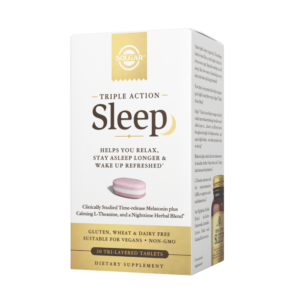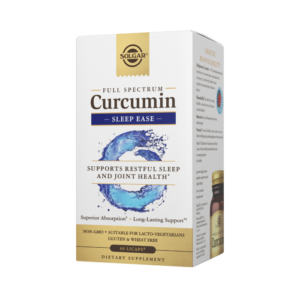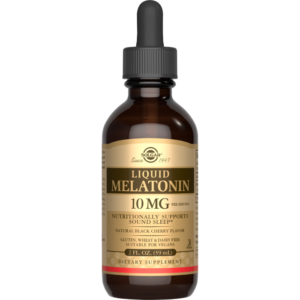Key Takeaways:
- Circadian rhythms are 24-hour cycles that are part of the body’s internal clock. The sleep-wake cycle is one of the most important circadian rhythms.
- There are three non-REM and one REM sleep stage that makes up one full sleep cycle repeated several times each night.
- Taking a sleep-supporting supplement is one of the best ways to promote a healthy circadian rhythm.
For most people, sleep is one of the easier things you have to do in a normal 24-hours. You turn off the lights, close your eyes, and (hopefully) don’t wake up until your alarm startles you awake several hours later.
In the body, however, things are a bit more complicated. When you sleep, your body engages in recovery processes, allowing you to perform better physically and mentally the next day and over the long-term.
Each hour of sleep is not the same; as you snooze, distinct stages of sleep unfold, each with a unique purpose.
Let’s dive a little deeper into how your circadian rhythm (or internal clock) works and what happens during each sleep cycle.
What is a circadian rhythm?
Circadian rhythms are 24-hour cycles that are part of the body’s internal clock. Circadian rhythms exist in all types of living things – they help flowers open and close at the right time and keep nocturnal animals from leaving their shelters during the daytime when they could be exposed to predators.1
When people talk about circadian rhythms, they are most often talking about the sleep-wake cycle. Our circadian rhythm aligns our sleep and wakefulness with day and night. During the day, light exposure causes the body’s internal clock to send signals that generate alertness and help keep us awake. As night falls, the lack of light signals to the body to begin producing melatonin, a hormone that promotes sleep.2
Still, even when you’re asleep, changes are taking place. Throughout the night, your total sleep is made up of several sleep cycles, and each process is made up of four individual stages.
The sleep cycle stages
There are two basic sleep cycles: rapid eye movement sleep (REM sleep) and non-REM sleep. Throughout the night, you cycle through REM and non-REM sleep several times, with increasingly longer, deeper REM periods occurring towards morning.3
Let’s take a closer look at each of the four sleep stages.
Stage 1 (N1) – Non-REM
Length: 1-5 minutes
Stage 1 is the “dozing off” stage. During this stage, the body hasn’t fully relaxed, and the body and brain activities begin to slow with periods of brief movements or twitches. It’s easy to wake a person during N1 sleep.
Stage 2 (N2) – Non-REM
Length: 10-60 minutes
Stage 2 brings a drop in body temperature, relaxed muscles, and slowed breathing and heart rate, which puts the body into a more subdued state. In general, brain activity slows, save for short bursts of activity which help resist being woken up by external stimuli. Each N2 cycle becomes longer than the last, and a person typically spends half their sleep time in N2 sleep.
Stage 3 (N3) – Non-REM
Length: 20-40 minutes
Stage 3 sleep is also known as deep sleep, and it is much harder to wake someone up during this stage. Muscle tone, pulse, and breathing rate decrease as the body relaxes further.
This stage is critical to restorative sleep, allowing for physical recovery and growth. Even though brain activity is reduced, research shows that deep sleep may contribute to insightful thinking, creativity, and memory.4 5
You spend most of your sleep in deep sleep, with each stage getting progressively shorter as your body spends more time in REM.
Stage 4 (REM) – REM Sleep
Length: 10-60 minutes
During REM sleep, brain activity increases, nearing the levels of when you’re awake. In REM sleep, the body also experiences atonia, temporary paralysis of the muscles (excluding eyes and those that control breathing).
REM sleep is especially important for cognitive functions like memory, learning, and creativity. REM sleep is also responsible for your most vivid dreams, thanks to increased brain activity. Dreams can occur in any sleep stage but are more likely during REM sleep.
Why sleep stages matter
Sleep stages aren’t merely a way for your body to progress through sleep – they are crucial for your brain and body’s recovery and development. Not getting enough deep sleep and REM sleep can have profound consequences on your thinking, emotions, and health.6 7
Can you reset your circadian rhythm?
There are many reasons you may want to adjust your sleep-wake cycle, from starting a job that requires you to work late or need to adapt to a new timezone. Although your genes or working graveyard shifts may impact your sleep schedule, there are some ways to promote healthy sleep habits.
1. Go to bed and wake up at the same time
Keeping a regular sleep schedule will help reset your circadian rhythm. Even if you are unable to fall asleep at the desired time, make sure to set an alarm and wake up at the set time anyway.
2. Exercise regularly
Exercise and sleep go hand in hand. Regular exercise can improve sleep quality and duration, and adequate sleep ensures more strength and endurance when you work out. However, try not to exercise within 1-2 hours of your bedtime, as this may make it more difficult to fall asleep.
3. Play with your meal times
Circadian rhythms regulate when you feel hungry and how the body digests food. Some studies have found that advancing or delaying meals can change how your body regulates these processes, causing you to feel alert or tired at different times than what you’re used to.8
4. Take a sleep supplement
Melatonin is a naturally occurring hormone in the body that plays a vital role in the maintenance of your circadian rhythm or sleep-wake cycle. Taking melatonin can help with occasional sleeplessness.* It can also help with jet lag and promote sound, quality sleep.* It can help support a relaxed mood and promote restful sleep.*
Here are a few of our favorites:
Solgar® Triple Action Sleep Tri-Layer Tablets
With three layers of ingredients, this unique formula can help you stay asleep longer and wake up feeling refreshed during times of occasional sleeplessness.* Each tablet contains:
- Melatonin: an important factor in your sleep-wake cycle that’s supplied as both quick-release melatonin to help you fall asleep faster and time-release melatonin to help you stay asleep longer.
- L-Theanine: an amino acid that interacts with neurotransmitter GABA to support a calm and relaxed mood.*
- Nighttime Herbal Blend: made up of chamomile, lavender, lemon balm, and valerian root extracts.
This advanced sleep supplement also leverages clinically-studied time-release melatonin that is released throughout the night to work with your body’s natural sleep cycle to help you stay asleep.*
Solgar® Sleep & Stress Support
Solgar® Sleep & Stress Support is a melatonin-free formula made with sleep-supporting herbs and L-theanine for stress support for occasional sleeplessness and occasional stress.* Each serving is 100% drug-free and non-habit forming, and helps you:
- Fall asleep quickly*
- Improve sleep quality so you can wake up feeling ready to take on the day*
- Feel calm and relaxed*
- Stay rested throughout the night*
And, it’s vegan-friendly, non-GMO, gluten-free and dairy-free!
Solgar® Full Spectrum Curcumin Sleep Ease
Two Solgar® Full Spectrum Curcumin Sleep Ease Licaps™ every night helps you support restful sleep cycle patterns and restore mental calmness.*
Let’s take a look at what’s inside:
- Full Spectrum Curcumin – a highly-absorbable form that provides antioxidant properties and is shown to be longer lasting compared to native curcumin extracts.*†
- PharmaGABA® – quickly restores mental relaxation and calmness. Helps calm feelings of occasional stress.*
- Melatonin – helps with occasional sleeplessness and helps you fall asleep faster and stay asleep longer.*
- Venetron® – an extract from the Rafuma plant, commonly found in nighttime formulas.
A single 1 mL drop of this cherry-flavored liquid melatonin at bedtime can help with occasional sleeplessness, jet lag, and works with your circadian rhythm so that you can wake up feeling refreshed and revitalized!*
At the end of the day
Getting eight to ten hours of sleep each night is one of the best things you can do for your health and wellbeing. Understanding how sleep works is the first step to maximizing your sleep quality so that you can be your best self during the day.
For more quick tips on health and wellness or to find out the latest about Solgar® products, follow us on Instagram! (@solgar)
*These statements have not been evaluated by the Food and Drug Administration. These products are not intended to diagnose, treat, cure or prevent any disease.
†These statements are based on a human study of NovaSOL® curcumin in comparison with native curcumin extract, using an object measure (metabolite analysis).
The information provided on this site is intended for your general knowledge only and is not a substitute for professional medical advice or treatment for specific medical conditions. Always seek the advice of your physician or other qualified healthcare provider with any questions you may have regarding a medical condition. The information on this website is not intended to diagnose, treat, cure or prevent any disease. Never disregard medical advice or delay in seeking it because of something you have read on the Solgar® site.





